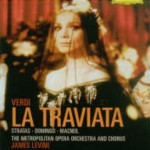When Franco Zeffirelli’s film version of La traviata opened in Paris in 1983, 800,000 movie-goers went to see it in six weeks. It was eventually nominated for a pair of Oscars and it arguably remains the finest film version (rather than filming of a performance) of an opera ever made. It is lip-synched but so skillfully filmed that we rarely pick up on it, and the interior monologs (part of “Ah, fors’e lui” for instance) are very effective.
During the prelude to the first act Zeffirelli takes us into Violetta’s fabulous apartment, dimly lit, colors washed-out, furniture covered, a few strangers looking about. After a moment we see Violetta dying in her bedroom; the first two acts are a flashback of her life leading up to this point. There are flashbacks within the flashbacks as well; many shots are filtered (Violetta is mostly in soft-focus). As we might expect from Zeffirelli, the settings are lavish beyond description, the party scenes so over-crowded that you can almost feel rustled by the crowds rushing by and smell the cigar smoke. The demimonde are idealized into a state of such fabulous wealth that you want to be one of these people, tuberculosis or not. (How come I never get to go to parties like this?)
No detail is too small; people eat during the “Brindisi”, lascivious men pinch buxom women on the far sides of the screens, each of the extras has a personality–there are no stand-and-move-as-one choral moments. The second act–in the countryside–is set in a greenhouse so enormous that you could grow half the Amazon jungle in it.
We might object to the cuts in the score that Zeffirelli insisted on and that conductor James Levine agreed to: In addition to the standard ones, they show up in “Un di felice” and “Dite alle giovane” (and to the end of the scene–quite disfiguring); Act 3 goes straight from the prelude to the reading of the letter; and after Alfredo enters we cut directly to “Parigi o cara” (also trimmed). The whole opera takes an hour and 40 minutes. But it all works–the party scenes are manic and fun, the intimate moments truthful and touching, the romantic/flirtatious spots genuine and not embarrassing.
Teresa Stratas’ Violetta is a fragile creature and the camera loves her; there’s not a false move in her reading of the part. It isn’t until you watch (or just listen to) the film a couple of times that you realize how poor some of her singing is: In “Sempre libera” the runs are smudged and the aria is transposed down but still gives her trouble; indeed, hers is such a complete portrait that it really does need to be seen as well as heard. Placido Domingo’s Alfredo looks a bit mature but his ardency and star power are crystal clear and he’s in fine voice. Cornell MacNeil’s Germont is wooden and dull, though well sung. The rest of the cast is top notch.
Levine’s tempos are very quick–so unlike him in general–but clearly he’s adjusting for the medium. Still, “Die alle goivane” does not have time to breathe, and Violetta’s “Prende…queste imagine…” loses some effect. Nevertheless, this is a wonderful, very touching performance (stunningly played and sung by the Met forces) and a feast for the eyes. Subtitles are available in all major European languages and Chinese; no surround-sound. In fact, the sound quality is not ideal at all, but it’s never a real drawback. But this is to see Stratas–and a world of excess.
































